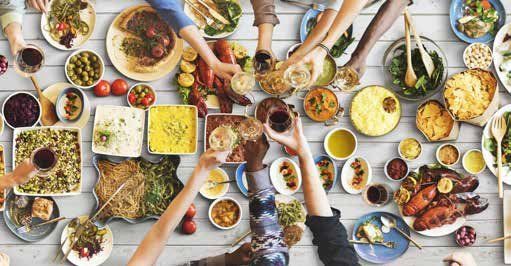Gathering Around the Immigrant's Table
“I also miss the mountains and rivers of my childhood. I miss my old
friends. So, I return now and then, when I cannot still the longing of
my heart. The funny thing is, the moment I am in one country, I am
homesick for the other.”
I remember reading these lines from Allen Say’s “Grandfather’s Journey” picture book. It defined how I felt as a foreign-born person in America, being in one country while longing for the other.
These are the roots of the idea for my book “The Immigrant’s Table.”
I began to think about the ways in which my heritage is reflected in my cooking. I grew up in Switzerland, and the way I prepare meals – even something as simple as a daily lunch – differs from traditional American families as a result of my country of origin, my travels and experiences. I wondered about the lives of other women who were born abroad. When they came here, did their cooking evolve? Was food a way to maintain their cultural heritage or to adapt to a new place? How did they feed their own families? How did they adjust to this new culture?
Home cooking plays a distinct role in our cultural identity. I chose to focus on food as a way to explore how it brings people together while still representing our individual families, traditions and cultures. Even when people adopt new customs, languages, clothing or habits, many keep their culinary tastes and preferences and pass them on to their children.
I often spoke about my idea to my husband. In 2015, he offered me a small voice recorder for Christmas. It gave me the initial courage to approach Donna, the first woman whose story I share in my book. I knew she was planning to return to Australia after living in the United States for 35 years, so I took the opportunity to interview her.
Soon after, I began to reach out to friends, acquaintances and neighbors. Then I asked my husband’s coworkers, parents from my sons’ soccer teams, people I met in grocery stores, restaurants, various shops or other public places. I started to get comfortable telling total strangers about my project and asking if they were interested in participating. I was rejected so many times that it was no longer a big deal!
In total, 27 women shared their stories and recipes with me. Like me, they were born outside of the United States. Each chapter begins with a narrative of their early lives and the culinary traditions of their home countries. They described their transition to living in America, from their reasons for coming to their first impressions of this country and now their current perspectives. The Immigrant’s Table reveals who they have become through their individual journeys.
I hope my book will spark conversations and help bring people together. It highlights the importance of community and connection by exploring our diversity and heritage. I have listened, laughed and been moved to tears, but most of all I have been humbled and inspired by these women. I want people to know about them, their struggles and their victories. These women have different stories, but all of them are overcomers, all of
them are generous and strong.
Celiane Widmer-Limes has spent her whole life fascinated by other cultures’ histories and culinary traditions. She grew up in Switzerland and has traveled extensively through Europe, Southeast Asia, Eastern Africa and South America. She resides in Washington State with her husband and three sons where she is currently pursuing a degree in anthropology.











